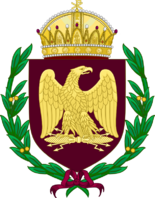User:Latium/Sandbox4: Difference between revisions
No edit summary |
|||
| Line 1: | Line 1: | ||
This article lists '''political parties and organizations in the [[Latium]]'''. The first political parties began to officially form in the mid 1860s at the advent of the political reforms of [[Theophylactus I Augustus]]. Initially these parties formed around prominent figures in the Senate, often reshuffling at every election. Today, the two largest senatorial factions are the center-right [[Populares (Latium)|Populares]] and the center-left [[Progressis (Latium)| | This article lists '''political parties and organizations in the [[Latium]]'''. The first political parties began to officially form in the mid 1860s at the advent of the political reforms of [[Theophylactus I Augustus]]. Initially these parties formed around prominent figures in the Senate, often reshuffling at every election. Today, the two largest senatorial factions are the center-right [[Populares (Latium)|Populares]] and the center-left [[Progressis (Latium)|Boni]]. | ||
{{Politics of Latium|state=collapsed}} | {{Politics of Latium|state=collapsed}} | ||
==Senatorial factions== | ==Senatorial factions== | ||
Unofficial factions in the [[Senate of Latium|Senate]] predate any formalization of the modern factional system, and have existed in various forms since the earliest days of the assembly. The formalization of factions first appeared in the mid-19th century with the appearance of the [[Populares (Latium)|Populares]] in 1833. Initially, the Populares favored the common people and better represented their interests in the Senate. By 1842, the Populares came to favor Imperial interests and the reforms of [[Theophylactus I Augustus|Emperor Theophylactus I]], in 1848, and have since become the center-right senate faction. | |||
The [[Populares (Latium)|Populares]] are the oldest extant senate faction, and are the only faction to predate the electoral process; it has participated in every election since 1866. [[Boni (Latium)|Boni]] is the second oldest faction, and currently the second largest, while [[Aliis]] is the most recently established faction, first earning faction status in 2017. Independent senators are rare due to electoral requirements, and are most often individuals appointed by the Emperor whose seats are not bound by election. These independent senators are often granted special dispensation to forgo joining a faction, which are collectively referred to as Independentes. | According to Senate rules, and later Imperial Edict, modern [[wikipedia:Political party|political parties]] are prohibited from the Senate and political offices in Latium. Representation in the senate is based upon the theory of [[wikipedia:virtual representation|virtual representation]], and the means of voting necessitates the existence of factions in order for elections to be fulfilled. The [[Sacred Assembly]] is responsible for monitoring senate elections, and also sanctioning official senate factions. To qualify as a faction, a group of citizens must present an [[wikipedia:List MP|senatorial list]] of no fewer than 350 eligible citizens, 100,000 verified signatures supporting the faction, pay a filing fee of {{LAS}}500,000, a distinct leadership, and 10 comital rank sponsors. Upon submission of all requirements, the Imperial Election Committee [[wikipedia:Vetting|vets]] all senatorial lists and faction members. Individuals on senatorial lists are heavily scrutinized before a faction is officially sanctioned. Senate factions are prohibited from sponsoring individuals running for lower or local office and may face heavy penalties for doing so, possibly including loss of imperial approval as a faction and potential removal of all senators from said faction. | ||
The [[Populares (Latium)|Populares]] are the oldest extant senate faction, and are the only faction to predate the electoral process; it has participated in every election since 1866. [[Boni (Latium)|Boni]] is the second oldest faction, and currently the second largest, while [[Aliis]] is the most recently established faction, first earning faction status in 2017. Independent senators are rare due to electoral requirements, and are most often individuals appointed by the Emperor whose seats are not bound by election. These independent senators are often granted special dispensation to forgo joining a faction, which are collectively referred to as Independentes. A fifth faction, [[Provincialis (Latium)|Provincialis]], sporadically exists in the Senate due to its inability to submit a complete senatorial list or not reeving enough votes. | |||
{| class="wikitable" style="width:100%;" | {| class="wikitable" style="width:100%;" | ||
!colspan=3 |Faction | !colspan=3 |Faction | ||
| Line 17: | Line 18: | ||
| style="background-color:#DC143C" | | | style="background-color:#DC143C" | | ||
| [[file:Populares Emblem.svg|100px]] | | [[file:Populares Emblem.svg|100px]] | ||
|'''[[Populares (Latium)|Populares]]'''<br><small>''Favoring the | |'''[[Populares (Latium)|Populares]]'''<br><small>''Favoring the Empire'' | ||
| style="background:#98FB98; color:black"|<center>Majority</center> | | style="background:#98FB98; color:black"|<center>Majority</center> | ||
| [[File:NewPompilius.jpeg|100px]]<br>[[Alexander Pompilius]] | | [[File:NewPompilius.jpeg|100px]]<br>[[Alexander Pompilius]] | ||
| {{Composition bar|420|794|hex=#DC143C}}</center> | | {{Composition bar|420|794|hex=#DC143C}}</center> | ||
| [[wikipedia:Conservatism|Conservatism]], [[wikipedia:State socialism (Germany)|imperial socialism]], | | [[wikipedia:Conservatism|Conservatism]], [[wikipedia:State socialism (Germany)|imperial socialism]], [[wikipedia:big tent]] | ||
| | | | ||
|- | |- | ||
| style="background-color:#FFD300" | | | style="background-color:#FFD300" | | ||
| Line 31: | Line 32: | ||
| {{Composition bar|273|794|hex=#FFD300}}</center> | | {{Composition bar|273|794|hex=#FFD300}}</center> | ||
| [[wikipedia:Liberalism|Liberalism]], [[wikipedia:Social democracy|social democracy]] | | [[wikipedia:Liberalism|Liberalism]], [[wikipedia:Social democracy|social democracy]] | ||
| | | | ||
|- | |- | ||
| style="background-color:#1F75FE" | | | style="background-color:#1F75FE" | | ||
| Line 39: | Line 40: | ||
| [[file:Stefano Patuanelli 2019.jpg|100px]]<br>[[Felix Procilius]] | | [[file:Stefano Patuanelli 2019.jpg|100px]]<br>[[Felix Procilius]] | ||
| {{Composition bar|98|794|hex=#1F75FE}}</center> | | {{Composition bar|98|794|hex=#1F75FE}}</center> | ||
| [[wikipedia:Populism|Populism]], [[wikipedia:Direct democracy|direct democracy]], [[wikipedia:Secularism|secularism | | [[wikipedia:Populism|Populism]], [[wikipedia:Direct democracy|direct democracy]], [[wikipedia:Secularism|secularism]] | ||
| | | | ||
|- | |- | ||
| style="background-color:#CCCCCC" | | | style="background-color:#CCCCCC" | | ||
| Line 49: | Line 50: | ||
| {{Composition bar|3|794|hex=#CCCCCC}}</center> | | {{Composition bar|3|794|hex=#CCCCCC}}</center> | ||
| Varied | | Varied | ||
| | | | ||
|- | |- | ||
|} | |} | ||
==Former factions== | |||
== | {| class="wikitable" style="width:90%;" | ||
{| class="wikitable" style=" | !colspan=2 |Faction | ||
!First represented | |||
!Last represented | |||
!Ideology | |||
!Reason | |||
|- | |- | ||
| style="background-color:#FFA500" | | |||
| '''[[Medietas]]''' | |||
| 1890 | |||
| 1946 | |||
| | |||
| | |||
|- | |- | ||
| style="background: # | | style="background-color:#326760" | | ||
| [[ | | '''[[Provincialis]]''' | ||
| 1995 | |||
| | | 2017 | ||
| | | | ||
| | | | ||
| | |||
|- | |- | ||
|} | |} | ||
[[Category:Latium]] | [[Category:Latium]] | ||
[[Category:Political parties in Latium]] | [[Category:Political parties in Latium]] | ||
Revision as of 00:48, 11 April 2021
This article lists political parties and organizations in the Latium. The first political parties began to officially form in the mid 1860s at the advent of the political reforms of Theophylactus I Augustus. Initially these parties formed around prominent figures in the Senate, often reshuffling at every election. Today, the two largest senatorial factions are the center-right Populares and the center-left Boni.
| This article is part of a series on the |
| Politics of Latium |
|---|
 |
Senatorial factions
Unofficial factions in the Senate predate any formalization of the modern factional system, and have existed in various forms since the earliest days of the assembly. The formalization of factions first appeared in the mid-19th century with the appearance of the Populares in 1833. Initially, the Populares favored the common people and better represented their interests in the Senate. By 1842, the Populares came to favor Imperial interests and the reforms of Emperor Theophylactus I, in 1848, and have since become the center-right senate faction.
According to Senate rules, and later Imperial Edict, modern political parties are prohibited from the Senate and political offices in Latium. Representation in the senate is based upon the theory of virtual representation, and the means of voting necessitates the existence of factions in order for elections to be fulfilled. The Sacred Assembly is responsible for monitoring senate elections, and also sanctioning official senate factions. To qualify as a faction, a group of citizens must present an senatorial list of no fewer than 350 eligible citizens, 100,000 verified signatures supporting the faction, pay a filing fee of $500,000, a distinct leadership, and 10 comital rank sponsors. Upon submission of all requirements, the Imperial Election Committee vets all senatorial lists and faction members. Individuals on senatorial lists are heavily scrutinized before a faction is officially sanctioned. Senate factions are prohibited from sponsoring individuals running for lower or local office and may face heavy penalties for doing so, possibly including loss of imperial approval as a faction and potential removal of all senators from said faction.
The Populares are the oldest extant senate faction, and are the only faction to predate the electoral process; it has participated in every election since 1866. Boni is the second oldest faction, and currently the second largest, while Aliis is the most recently established faction, first earning faction status in 2017. Independent senators are rare due to electoral requirements, and are most often individuals appointed by the Emperor whose seats are not bound by election. These independent senators are often granted special dispensation to forgo joining a faction, which are collectively referred to as Independentes. A fifth faction, Provincialis, sporadically exists in the Senate due to its inability to submit a complete senatorial list or not reeving enough votes.
| Faction | Majority | Senate leader | Seats in the Senate | Ideology | Party affiliations | ||
|---|---|---|---|---|---|---|---|

|
Populares Favoring the Empire |
 Alexander Pompilius |
420 / 794
|
Conservatism, imperial socialism, wikipedia:big tent | |||

|
Boni For a Better Latium |
 Flavia Lepera |
273 / 794
|
Liberalism, social democracy | |||

|
Aliis For the Alternative |
 Felix Procilius |
98 / 794
|
Populism, direct democracy, secularism | |||
| Independentes Independents |
None | 3 / 794
|
Varied | ||||
Former factions
| Faction | First represented | Last represented | Ideology | Reason | |
|---|---|---|---|---|---|
| Medietas | 1890 | 1946 | |||
| Provincialis | 1995 | 2017 | |||